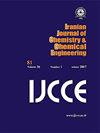Novel adsorbent nanoscale zero-valent iron supported on graphene for the removal of diazo Direct Red 81 from aqueous solution: Isotherm, kinetics, and thermodynamic studies
IF 1
4区 工程技术
Q4 CHEMISTRY, MULTIDISCIPLINARY
Iranian Journal of Chemistry & Chemical Engineering-international English Edition
Pub Date : 2021-08-09
DOI:10.30492/IJCCE.2021.524000.4556
引用次数: 0
Abstract
In this study, nanoscale zero-valent iron-graphene (nZVI-G) composite was synthesized and applied for the removal of diazo Direct Red 81 from aqueous solution. The prepared nanocomposite was characterized using scanning electron microscopy (SEM), energy-dispersive X-ray spectroscopy (EDS), X-ray diffraction analysis (XRD), and Fourier-transform infrared spectroscopy (FTIR). The particle size was in the range of 20 to 35 nm. The effect of influential experimental variables on dye removal such as contact time, pH, adsorbent dosage, initial dye concentration, and the temperature was investigated. In optimum conditions, including contact time of 10 min, pH = 3, the adsorbent dosage of 0.05 g, and initial dye concentration=10 mg/l, dye removal was achieved 92%. Different adsorption isotherm models (Langmuir and Freundlich) were used and adsorption followed Langmuir isotherm well (R2= 0.9773). The maximum Langmuir adsorption capacity of nZVI-G was obtained 29.07 mg g-1. The pseudo-first-order kinetic model with R2=0.9838 fitted well to the experimental data. The thermodynamic parameters (∆G,∆H,∆S) were calculated and the results revealed that the adsorption of dye was spontaneous and exothermic. The nZVI-G composite was found to be a low-cost potential candidate with high adsorption capability to be applied as an adsorbent for the removal of Direct Red 81 from the aqueous media. Reduction degradation reaction which rapidly produces radicals has a major effect on reaction time. This nanoadsorbent has the ability to adsorb, reduction and degradation of pollutants, so the dye was removed efficiently.石墨烯负载的新型吸附剂纳米级零价铁用于从水溶液中去除重氮直接红81:等温线,动力学和热力学研究
本研究合成了纳米级零价铁-石墨烯(nZVI-G)复合材料,并将其应用于水中重氮直接红81的去除。采用扫描电镜(SEM)、能量色散x射线能谱(EDS)、x射线衍射分析(XRD)和傅里叶变换红外光谱(FTIR)对制备的纳米复合材料进行了表征。粒径在20 ~ 35 nm之间。考察了接触时间、pH、吸附剂投加量、初始染料浓度、温度等实验变量对染料去除率的影响。在接触时间为10 min、pH = 3、吸附剂用量为0.05 g、初始染料浓度为10 mg/l的最佳条件下,染料去除率达到92%。采用不同的吸附等温线模型(Langmuir和Freundlich),吸附较好地遵循Langmuir等温线(R2= 0.9773)。nZVI-G的最大Langmuir吸附量为29.07 mg g-1。拟一阶动力学模型R2=0.9838,与实验数据拟合良好。通过计算热力学参数(∆G,∆H,∆S),结果表明染料的吸附是自发的、放热的。nZVI-G复合材料被认为是一种低成本的潜在候选材料,具有高吸附能力,可以作为一种吸附剂从水介质中去除直接红81。还原降解反应迅速产生自由基,对反应时间有重要影响。该纳米吸附剂具有吸附、还原和降解污染物的能力,可有效去除染料。
本文章由计算机程序翻译,如有差异,请以英文原文为准。
求助全文
约1分钟内获得全文
求助全文
来源期刊

Iranian Journal of Chemistry & Chemical Engineering-international English Edition
CHEMISTRY, MULTIDISCIPLINARY-ENGINEERING, CHEMICAL
CiteScore
2.80
自引率
22.20%
发文量
0
审稿时长
6-12 weeks
期刊介绍:
The aim of the Iranian Journal of Chemistry and Chemical Engineering is to foster the growth of educational, scientific and Industrial Research activities among chemists and chemical engineers and to provide a medium for mutual communication and relations between Iranian academia and the industry on the one hand, and the world the scientific community on the other.
 求助内容:
求助内容: 应助结果提醒方式:
应助结果提醒方式:


